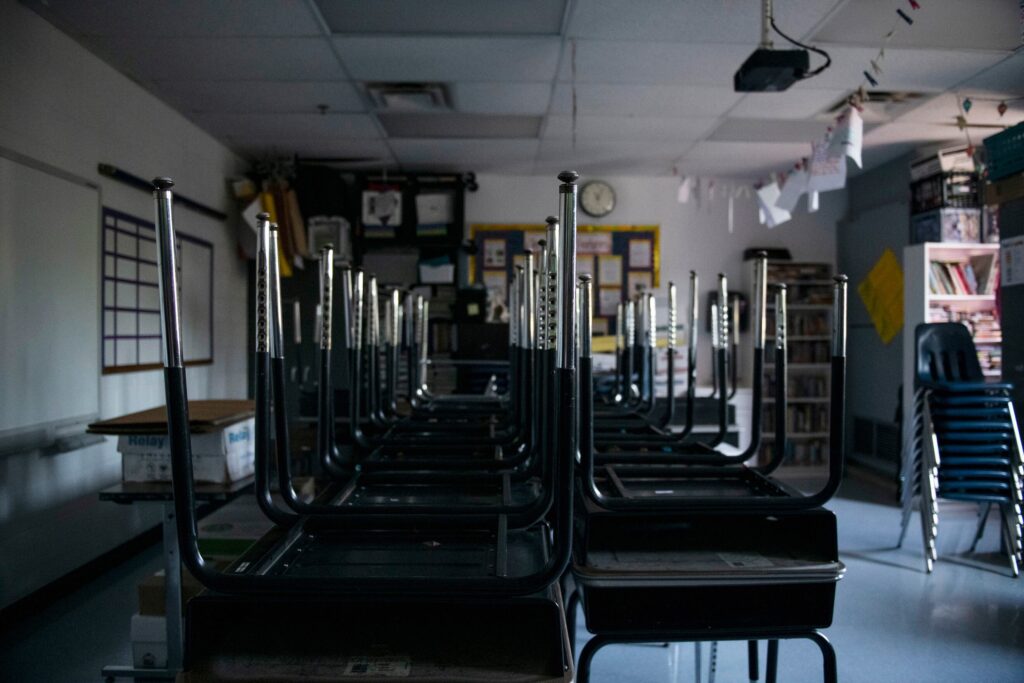Oregon’s K-12 public school districts aren’t fat cat employers by any stretch. Dependent on state funding and facing increasing pension contributions and other costs, districts are already laying off staff as they try to preserve the most critical services for Oregon’s 550,000 schoolchildren.
Yet a bill headed for a vote in the Oregon House treats districts as if they print their own money and are putting the screws to employees.
Senate Bill 916
, sponsored by a slew of
union-friendly Democrats
, would allow teachers, grocery clerks and many other unionized workers to collect unemployment pay when they go on strike for longer than two weeks. The proposal – the most expansive such policy in the nation – not only upends the negotiating dynamic to heavily favor unions; it also carries significant financial risks for school districts which, like other public employers, must reimburse the unemployment fund for every dollar that goes to striking workers. That’s money that could otherwise help students learn to read, explore new subjects and develop essential life skills.
Oregon should not be extending such unique benefits at the expense of schoolchildren, nor should it distort the purpose of the unemployment fund from supporting those laid off from their jobs. Legislators who recognize the hypocrisy of claiming to support public schools while approving a bill that undermines them should reject SB 916. And Oregonians tired of seeing schools being forced to use education dollars on non-education costs should encourage their representatives – particularly Democrats, who will determine this bill’s fate – to vote “no.”
Supporters of SB 916 cast the proposal as a way to level the playing field between employers and workers. They contend the bill won’t incentivize more or longer strikes, but in fact will lead to fewer work stoppages because employers will be pressured to negotiate more fairly. “It brings people to that last, best, final offer sooner,” Rep. Dacia Grayber, D-Southwest Portland and a chief sponsor of the bill, told the editorial board. Without unemployment pay, backers contend, workers who go on strike can be “starved” into accepting bad contracts by employers who just wait them out.
But advocates don’t do a great job of pointing to circumstances in Oregon where that has actually happened. For example, nurses at eight Providence hospitals went on strike for a month and a half earlier this year. Even without SB 916, they scored “a major victory,”
their union declared
, with wage increases of 20% to 42% over the life of the contracts. The Portland Association of Teachers crowed that its November 2023 strike ended with “the
largest cost of living increase
in the local’s history.” Grayber said she has heard that some workers have mixed feelings about their new contracts. But especially in Portland Public Schools’ case, where those cost-of-living increases are helping drive layoffs and budget cuts, it’s hard to see how anyone could expect more.
Oregon’s bill also goes further than the three states that offer a similar benefit. New York, New Jersey and,
as of this month, Washington
, allow striking workers to collect unemployment pay. But none of the three provide a legally protected right for public employees to strike, as
The Oregonian/OregonLive’s Sami Edge reported
. Washington’s new legislation limits unemployment pay to six weeks and includes an expiration date for the policy. It also requires annual reports on the number and type of strikes as well as the impact to the insurance fund.
Oregon’s bill allows strikers up to 26 weeks of unemployment unless the state determines the insurance fund is at risk and includes neither an expiration date nor a reporting requirement. While most states bar public employees from striking, Oregon seems to be rolling out the red carpet.
The financial burden of paying for strikers’ unemployment isn’t the only issue for schools. The mere threat of that added cost – on top of any new contract terms – intensifies pressure on districts to accept agreements quickly, even if it will force cuts.
Legislators have made changes intended to respond to schools’ concerns, such as easing the process of clawing back unemployment benefits if districts give workers back pay. But the bill still poses significant challenges due to the inherent complexity of unemployment rules. Such efforts to minimize the harm only draw attention to how fundamentally problematic this policy is. And while supporters say there’s no data to suggest the bill will spark more or longer strikes, that’s a high-stakes experiment to undertake with students’ needs hanging in the balance.
School districts are not moneymaking machines; they are public entities fulfilling an educational mission with state-prescribed budgets. Staffing accounts for roughly 85% of their costs, leaving little flexibility to cover increasing expenses. Absent a huge change in funding, bigger contracts for workers will likely force fewer school days or opportunities for kids.
It does not take clairvoyance to see the unintended consequences this bill will have on schools and other public employers. The pleading from superintendents and school boards to reject this bill isn’t an act. And the long history of legislators piling demands on districts without funding them is well-documented.
Much of the talk about public education lately has rightly focused on accountability and the need to ensure school districts use their dollars on strategies that help children learn. Legislators, however, must accept that accountability, as well. They should start by voting “no” on SB 916.
-The Oregonian/OregonLive Editorial Board




More Stories
Editorial: School funding should pay for students’ needs, not striking employees
Editorial: School funding should pay for students’ needs, not striking employees
Editorial: School funding should pay for students’ needs, not striking employees